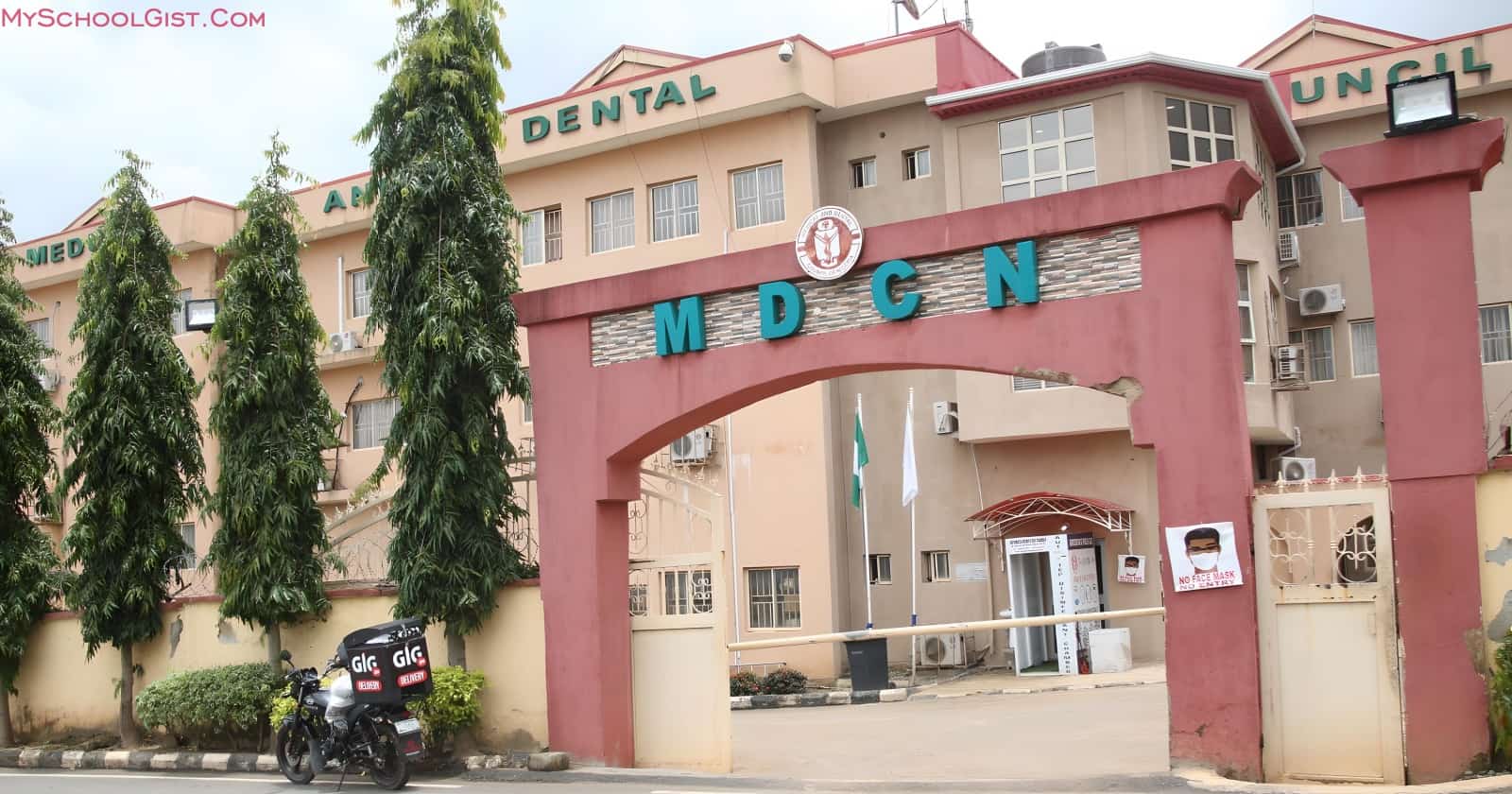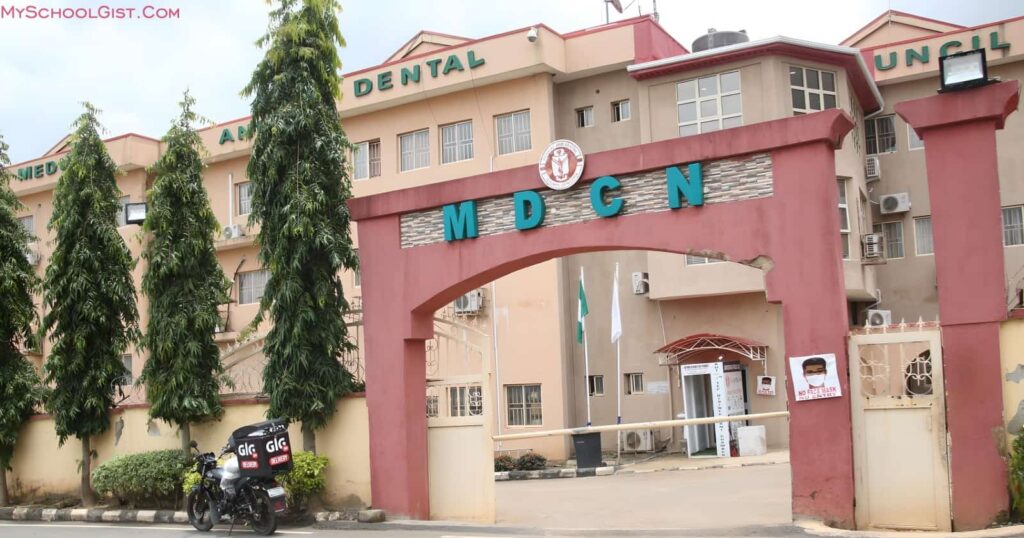The Medical and Dental Council of Nigeria (MDCN) has announced a revision to the annual practising licence fees. The new fees apply to medical and dental practitioners and take effect from 8 January 2025. Read on for details about the updated fees and compliance requirements.

The Medical and Dental Council of Nigeria (MDCN) has revised the annual practising licence fees for registered practitioners.
This change was approved following resolutions made during Nigerian Medical Association (NMA) meetings, including the 64th Annual General Meeting in May 2024.
Table of contents
New Licence Fees
- N40,000: For practitioners with 10 or more years of experience.
- N20,000: For practitioners with less than 10 years of experience.
The revised fees are in line with Section 14 of the MDCN Act.
Provisions Under the MDCN Act
The MDCN Act includes the following rules:
- Section 14(3): The Council may vary practising fees with the Minister’s approval.
- Section 14(5): Practising without paying the prescribed fee is an offence.
Penalties for Non-Payment
- First Offence: Fine of twice the practising fee.
- Subsequent Offences: Fine of at least ten times the practising fee.
Employers of unpaid practitioners may also face penalties unless they prove they were unaware or not involved.
Compliance and Inquiries
Practitioners are urged to comply with the revised fee structure to avoid penalties.
For questions regarding practising licences, email: practisinglicence@mdcn.gov.ng.
The MDCN appreciates your cooperation.
Introduction to MDCN Annual Fee Changes
The Medical and Dental Council of Nigeria (MDCN) plays a crucial role in regulating the practice of medicine and dentistry in the country. Recently, the council implemented changes to its annual fee structure, sparking widespread discussion and debate among healthcare professionals and the public. This article delves into the implications of these fee adjustments, exploring public reactions, stakeholder perspectives, and potential solutions to address concerns surrounding the MDCN annual fees.
Introduction to MDCN Annual Fee Changes
Background of the Medical and Dental Council of Nigeria (MDCN)
The Medical and Dental Council of Nigeria (MDCN) is the regulatory body responsible for setting standards and regulating the practice of medicine and dentistry in Nigeria. It plays a crucial role in ensuring the quality and professionalism of healthcare services in the country.
Explanation of Annual Fee Structure
The annual fee structure set by the MDCN is a vital component of its operations. These fees are paid by healthcare professionals to maintain their registration and ensure compliance with regulatory requirements. Changes in these fees can have significant implications for practitioners and the healthcare industry as a whole.
Overview of the MDCN Fee Structure
Breakdown of Current Fee Categories
The MDCN fee structure consists of various categories based on the practitioner’s level of experience and specialization. These fees contribute to the funding of regulatory activities and support the Council’s mandate in overseeing the healthcare sector.
Historical Trends in MDCN Fee Adjustments
Over the years, the MDCN has periodically adjusted its fee structure to align with changing industry standards and operational needs. These adjustments reflect the evolving landscape of healthcare in Nigeria and aim to ensure the sustainability of regulatory functions.
Public Perception and Reaction to MDCN Fee Changes
Initial Response from Healthcare Professionals
Healthcare professionals have varied reactions to the recent changes in MDCN annual fees. While some view it as a necessary measure to enhance regulatory effectiveness, others express concerns about the financial impact on practitioners, especially during challenging economic times.
Public Outcry and Concerns
The announcement of MDCN fee changes has sparked public outcry and raised concerns within the healthcare community. Practitioners, patients, and industry stakeholders are voicing their opinions on the potential implications of these adjustments and advocating for transparent communication and fair considerations.
Impact of Fee Changes on Healthcare Professionals
Financial Burden on Practitioners
The increased annual fees imposed by the MDCN may pose a financial burden on healthcare professionals, particularly those in resource-constrained settings. The additional costs could impact practitioners’ livelihoods and access to professional development opportunities.
Effects on Access to Healthcare Services
The ripple effects of MDCN fee changes extend to the broader healthcare system, potentially affecting access to quality services for patients. As practitioners navigate the financial implications of these adjustments, concerns arise regarding equitable access to healthcare and the overall sustainability of the industry.
Stakeholder Perspectives on MDCN Fee Adjustments
Views from Medical Associations and Unions
Medical associations and unions have expressed mixed views on the changes in MDCN annual fees. While some believe that the adjustments reflect the growing demands of regulatory compliance and quality assurance, others are concerned about the financial burden it places on healthcare professionals, especially in challenging economic times.
Government and Regulatory Body Responses
Government and regulatory bodies have defended the fee adjustments as necessary for enhancing the efficiency and effectiveness of healthcare regulation in Nigeria. They argue that the increased fees will enable the MDCN to carry out its mandate more effectively, ensuring higher standards of medical practice and patient care.
Analysis of Social Media Discourse on MDCN Fees
Trends in Online Conversations
Social media discourse on MDCN fees has been vibrant, with many professionals and the public sharing their opinions on the matter. Common themes include concerns about affordability, transparency in fee allocation, and the impact of these changes on the quality of healthcare services in the country.
Influence of Social Media on Public Perception
Social media plays a significant role in shaping public perception of the MDCN fee adjustments. The speed and reach of online platforms amplify both support and criticism, highlighting the need for the council to engage effectively with stakeholders to address concerns and build trust.
Comparison with International Medical Council Fees
Global Benchmarking of Regulatory Fees
Comparisons with international medical council fees reveal that while the MDCN fees are in line with regulatory bodies in some countries, they may pose a heavier financial burden on Nigerian healthcare professionals given the economic context. Understanding these differences is crucial for evaluating the fairness and impact of the fee adjustments.
Implications for Nigerian Healthcare Professionals
The implications of MDCN fee adjustments extend beyond financial considerations to the overall well-being of Nigerian healthcare professionals. Balancing the need for quality regulation with the affordability of fees is essential to ensure a sustainable and thriving healthcare sector in the country.
Recommendations for Addressing Public Concerns on MDCN Annual Fees
Potential Solutions and Alternatives
To address public concerns on MDCN annual fees, the council could explore options such as tiered fee structures based on income levels, transparent breakdown of fee allocations, and periodic reviews to assess the impact on professionals. Collaborative efforts with stakeholders can help identify viable solutions that balance regulatory needs and financial constraints.
Engagement Strategies for Better Communication
Effective communication strategies are key to managing public concerns around MDCN fees. Engaging with stakeholders through town hall meetings, informational campaigns, and online forums can foster transparency, address misconceptions, and gather feedback for continuous improvement. Building a dialogue based on trust and openness is essential in navigating challenges and finding mutually beneficial solutions.
Closing Thoughts on MDCN Annual Fee Changes
As the discourse surrounding the MDCN annual fee changes continues to evolve, it is evident that finding a balance between sustainable funding for regulatory bodies and ensuring affordability for healthcare professionals is crucial. By actively engaging with stakeholders, implementing transparent communication channels, and exploring alternative fee structures, the MDCN can work towards fostering a more collaborative and effective regulatory environment that benefits both practitioners and the public.
Frequently Asked Questions (FAQ)
1. Why did the MDCN decide to change its annual fee structure?
The MDCN implemented changes to its annual fee structure to address operational costs, enhance regulatory effectiveness, and ensure sustainable funding for overseeing medical and dental practices in Nigeria.
2. How have healthcare professionals responded to the MDCN fee adjustments?
Healthcare professionals have expressed concerns over the financial implications of the fee changes, with some highlighting potential challenges in meeting the new financial obligations imposed by the council.
3. What steps can the MDCN take to address public concerns about the fee adjustments?
The MDCN can consider engaging in dialogue with stakeholders, providing clarity on the rationale behind the fee changes, exploring more flexible payment options, and seeking feedback from the healthcare community to address concerns effectively.


